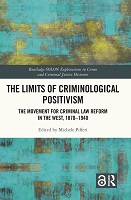The Limits of Criminological Positivism
Proposal review
The Movement for Criminal Law Reform in the West, 1870-1940
Abstract
The reform agenda promoted by the late-nineteenth-century penal reformers variously described as advocates of ‘positivism’, ‘social defense’ or as members of the ‘modern’ or ‘sociological’ school of criminal law threatened to erode the boundary separating criminal justice from extra-judicial forms of social control. Focusing on the German case, this essay investigates the debates between Imperial Germany’s ‘modern’ and ‘classical’ schools of criminal law over two questions that posed particularly stark challenges to the dividing line between criminal justice and extra-judicial forms of state intervention: (1) the implications of determinism for the question of legal responsibility, and (2) the implications that making ‘dangerousness’ the key criterion for punishment had for the nature of criminal justice and the relationship of judicial and extra-judicial measures of intervention. After analyzing these debates, the essay examines the rapprochement between the modern and classical schools of criminal law around 1900, the emergence of compromise proposals at the biennial congresses (Juristentage) of German-speaking jurists from 1900 to 1906, and the draft codes produced by Imperial Germany’s official penal reform commissions from 1906 until 1914. The essay advances two central arguments. First, the classical school’s endorsement of the dual-track system for recidivists and post-prison detention in an asylum for mentally abnormal offenders demonstrates that the classical school had, in fact, accepted the modern school’s claim that mentally ‘habitual criminals’ as well as ‘mentally abnormal’ offenders posed serious threats to the social order that were not being sufficiently addressed by the existing legal system. Second, the conflict between the modern and classical schools was not about the question of whether measures based on an offender’s ‘dangerousness’ (rather than the offense committed) were warranted; the majority of the classical school agreed that such measures, including indefinite detention, were warranted. Instead, the conflict concerned the different, narrower question of whether such measures should be imposed as part of the criminal justice system or whether they should be imposed outside this system, as extra-judicial measures, that is, in the form of administrative, police, welfare or medical measures. Therefore, the debate between the two schools was mostly a debate over what form social defense measures should take. Whereas the modern school called for a broader vision of criminal justice in the service of protecting society against dangerous individuals, the classical school sought to keep criminal justice narrowly focused on offense-based retributive justice and therefore insisted that social-defense measures based on dangerousness be farmed out to non-judicial state agencies.
Keywords
criminal, criminological, law, reform, positivismISBN
9780367340599, 9781032133539, 9780429323713Publisher
Taylor & FrancisPublisher website
https://taylorandfrancis.com/Publication date and place
2022Imprint
RoutledgeClassification
General and world history
Legal history
Crime and criminology

